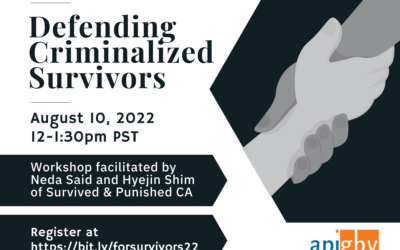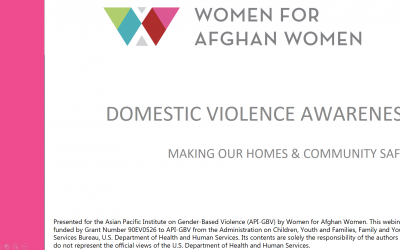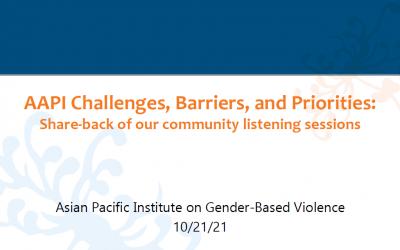Lifecourse Violence and Help-Seeking
The Asian Pacific Institute on Gender-Based Violence, in partnership with the University of Michigan and with funding from the National Institute of Justice, produced a new study on violence and help-seeking over the lifecourse. Like our Lifetime Spiral of Gender Violence, this study emphasizes the centrality of women’s experiences of abuses and vulnerabilities over their lifetime. The methodology and the results of the study reflect this analysis and has yielded rich data.
Quick Facts
- 51.7% of Filipina and 55.4% of Indian/Pakistani women had called the police at least once.
- Discussion: Contact with the police in the immediate aftermath of an Intimate Partner Violence (IPV) incident served as a gateway to other services such as legal assistance and/or domestic violence programs.
- Recommendations: Train police officers on an integrated response model; co-locate advocacy and support services within police departments; and enhance coordinated community responses with collaboration between law enforcement and advocates providing socio-culturally and linguistically tailored programs.
- 67.8% of Filipina and 50% of Indian/Pakistani women experienced stalking. Women who experienced stalking in any given year were more likely to call the police, seek legal assistance, or utilize a domestic violence program.
- Discussion: Of all types of IPV, stalking was most significantly associated with help-seeking.
- Recommendation: All providers should assess for stalking at all IPV incidents and at all points of contact with victims by including questions about stalking when taking reports, and giving it as much weight as sexual or physical violence.
- An estimated 30% of 2nd generation Filipina women experienced physical violence and an estimated 18% of 2nd generation Indian/Pakistani women experienced sexual violence at 16 years old.
- Discussion: High levels of IPV were already experienced by survivors at age 16.
- Recommendations: Design policies, practices, and resources about IPV in Asian teenagers and young adult relationship that take socio-cultural prohibitions against dating into account. Criminal justice system agencies and domestic violence programs serving Asian young adults should assess how parents might respond to victims, identify procedures to preserve confidentiality and safety for teen victims, and find culturally relevant ways to work with parents to ensure they are supportive of teen survivors of IPV.
Resources on Lifecourse Violence and Help-Seeking
Defending Criminalized Survivors Workshop
What happens when the laws that are supposed to protect survivors of domestic violence and sexual assault become turned against them? Survivors can be criminalized for reacting in self-defense, participating in criminal activity under their abusers’ coercion, or for failing to protect their children from witnessing or being impacted by violence in the home. Survivors of color, who struggle with mental health or substance dependency, or who otherwise don’t fold the “perfect victim” mold are disproportionately incarcerated. In this workshop, API-GBV will be joined by Hyejin Shim and Neda Said of Survived & Punished, who will guide participants through a discussion of the criminalization of survivors, and how advocates can support criminalized survivors.
Making Our Home and Community Safe: Responding to Afghan Evacuees
Following the sudden withdrawal of U.S. military presence from Afghanistan nearly 100,000 Afghan refugees were evacuated to the United States, with many still remaining on U.S. military bases and resettlement to happen by the end of January 2022. Many evacuees now face uncertainty related to their immigration status, concern about families back in Afghanistan, and the challenge of acclimating to life in the U.S.
AAPI Challenges, Barriers, and Priorities: Share-back of our community listening sessions
Over the past year and a half, API-GBV strove to learn more deeply from our community of front-line advocates, national partners, systems contacts, and allies through a series of listening sessions, assessment, and surveys. During this webinar, staff shared themes and...
Relationship Violence in Five Los Angeles Asian American Communities: Intergenerational Risk and Strengthening Factors
This study explores risk and protective factors in five Asian American communities: Cambodian, Chinese, Korean, North Indian Hindu, and Pakistani Muslim. These factors include cultural traditions, norms, attitudes and beliefs, particularly around gender roles, intergenerational family dynamics, intimate relationships, and approaches to child-rearing. This study involved 23 semi-structured focus groups (163 total participants) to gather the perspectives of youth/young adults, parents, community leaders, and service providers in six different languages across the five communities.



